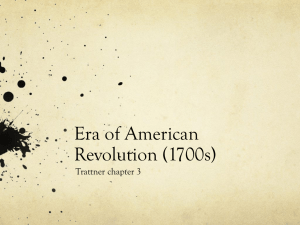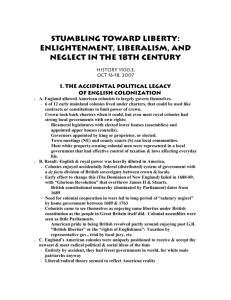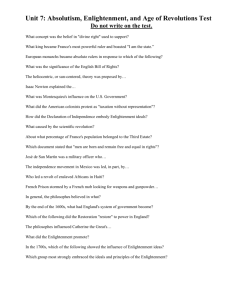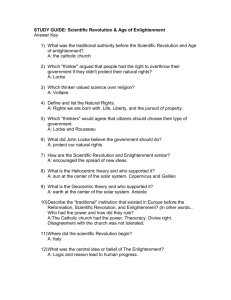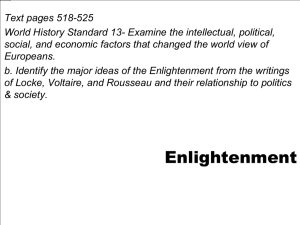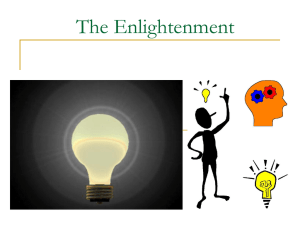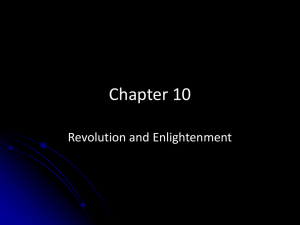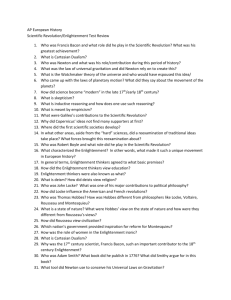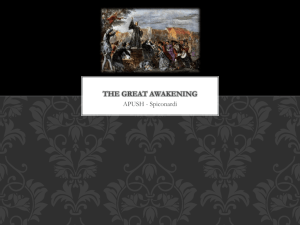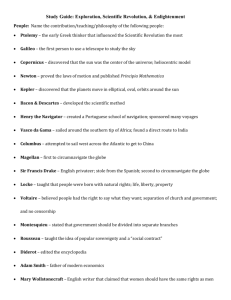Great Awakening and Enlightenment
advertisement
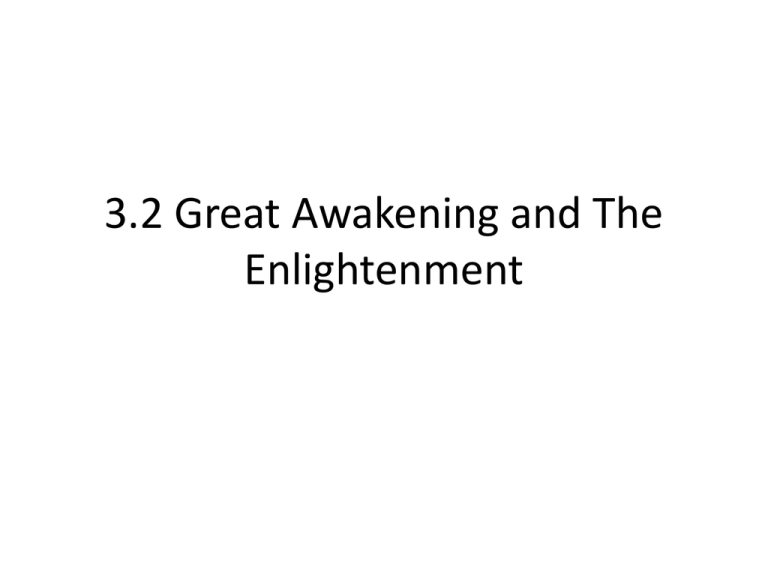
3.2 Great Awakening and The Enlightenment Standards • 7.11.4 Explain how the main ideas of the Enlightenment can be traced back to such movements as the Renaissance, the Reformation, and the Scientific revolution and to the Greeks, Romans, and Christianity. • 7.11.5 Describe how democratic thought and institutions were influenced by Enlightenment thinkers (e.g. John Locke, CharlesLouis Montesquieu, American founders.) • 8.1.1 Describe the relationship between the moral and political ideas of the Great Awakening and the development of revolutionary fervor. • 8.1.4 Describe the nation’s blend of civil Republicanism, classical liberal principles, and English parliamentary traditions Essential Questions 1. In what way did the spread of religious enthusiasm during the Great Awakening reinforce democratic ideas? 2. How were John Locke’s ideas about government different from the theory of the divine rights of monarchs? 3. How might John Locke’s ideas have contributed to the American Revolution? Quick Write • You have 5 minutes to response the questions. • You should write at least 60 words. • “What influences men/women more, religious or political movements? Give examples. The Great Awakening • Religious revival that swept through the colonies in 1730’s and 1740’s. -Puritan traditions declining in New England. -Restore the importance of religion in society. -Organization of new churches. Jonathan Edwards • Massachusetts‘ preacher. • Terrified listeners with images of God’s anger but promised salvation. “Sinners in the hands of an angry GOD!!!” George Whitefield • Invited everyone to come and listen. -Other Christian groups -Women -African Americans -Native Americans Effects • Colleges built. • People realized that if they could decide how to worship God, they could also decide how to govern themselves. -Separation of church and state. • Increased tolerance of religious differences. -New churches. The Enlightenment • Movement in 1700s emphasizing reason and observation. -Influenced by Renaissance, Reformation, and Scientific Revolution. -use of reason and science to explain world -spread quickly through books and pamphlets. John Locke • Enlightenment thinker. • Two Treatises of Government, 1690 -Natural rights= Rights humans are born with. -Life, liberty, and property. • Social contract= agreement people make to choose and obey a government that protected their natural rights. -If that government didn’t, the people had a right to resist and overthrown that government. -Challenged divine rights of kings. Baron de Montesquieu • Powers of the government should be clearly defined and limited. • Separation of Powers= Government split along three branches of government. -Legislative= Makes laws -Executive= Enforces laws -Judicial= Makes judgments based on the laws. Locke Montesquieu Effects on Colonies • Most educated colonial leaders embrace ideas. • Benjamin Franklin= American Enlightenment leader. - Successful printer and inventor. -Studied literature, math, science, and philosophy. Effects of Both Movements • Interest in learning and colleges found. • Questioned authority of both church and state. -Stressed individual’s importance. -atmosphere lead to American Revolution. Study Guide • Grab your textbook and study guide. On the left hand side copy and complete the following. • Study guide pg. 21, use pages 19-20 (in study guide) and Textbook pg. 44-48.
